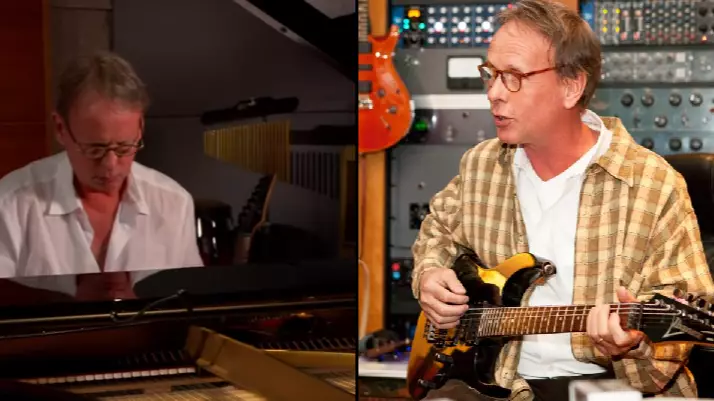
Bloody hell, the WWE has pumped out some belting entrance music in the past, hasn't it?
Obviously there have been tunes used by the likes of Limp Bizkit, as well as Motorhead recording songs especially for Triple H, but the original music has been spot on.
Some are instantly recognisable, like The Rock's 'Electrifying', which begins with his signature catch phrase 'IF YAAAA SMEEEEEELLLLL'. You've just got to nod your head to Stone Cold's 'Glass Shatters', too.
Advert
But where do these songs come from? Are they stock tunes from a floppy disk back in 1992? Are they put together on a laptop? Well, no, the majority were made by one man.
That man is Jim Johnston, and he can only be described as a legend.

Credit: WWE
Advert
Since 2014, the production duo called CFO$ have taken over the role of creating superstar entrance themes, with Johnston working on film soundtracks with WWE Studios. However, before that, he was the creative mind behind the music for the programmes, video games, website and entrances from 1985.
To pen a song for a specific wrestler is actually a thorough process, but in some instances it can shape the demeanour of that superstar.
What he's given is a bit of background on the character, as well as pictures of them to see what they're like and how they'll be marketed.
For example, when coming up with Randy Orton's theme, when he left Evolution and returned to the singles circuit, he imagined a troubled soul, who is quite within himself.
Advert
The song depicts a man who is quiet and mysterious, hearing voices in his head. This really shaped the way Orton would perform, taking on the persona of 'The Viper'.
Credit: WWE
It's not always so simple, as he recounts trying to come up with something for Stone Cold Steve Austin's original character, The Ringmaster.
Advert
"Steve Austin came to WWE as The Ringmaster, which was one of the dullest characters ever," he told WWE.com. "I mean, you talk about a guy without a persona.
"What did The Ringmaster mean? Was he from the circus? What is it? I have no idea what I wrote, but I bet it wasn't very good.
"Steve had his black trunks and black vest and looked like someone you didn't want to screw with. We debuted the theme as the tag to the vignettes introducing Steve's new persona."
And of course, it worked. The glass shattering prior to Steve's music hitting is now iconic, and lifted the roof off arenas.
Advert
It preceded heavy riffs, which Disturbed later took and added lyrics to: "Step up, because you're the next one in line for the kill/You don't believe me but I'm betting that you will/Step up, I'll let you live a little bit with the pain that I bring/You know it's only the beginning."
"But I had difficulty creating a glass break that felt violent enough," Johnston said.
"[Austin's] glass break ended up being a combination of three different glass breaks, someone falling downstairs and a car crash all mixed together."
Jim makes a point of playing all of the instruments on the track, but where vocals are needed he recruited unsigned musicians.
The most infamous, perhaps, is Chris Warren, who recorded original vocals for D-Generation X's music.
Jim invited him to record, giving him vague instructions as to what to say.
This led to the beginning of the song where Warren is heard saying: "You think you can tell us what to do? You think you can tell us what to wear?" He then launches into aggressive singing.
Johnston was so impressed by Warren's performance that he invited him back for numerous other recordings, such as X-Pac's 'Make Some Noise' and Triple H's 'My Time', as well as forming The DX Band, which would often perform at live events.
"Boy, is he a wild guy. I wanted something that sounded rebellious. I found Chris and told him to just let it go," Johnston said. "I didn't want something that kicked you in the butt, but something that teased you into it. I didn't know what I wanted to do.
"I stood in front of him at the microphone; he was a sweaty wreck because he had just been singing and screaming, and I started feeding him lines.
"Out came, 'You think you can tell us what to do?' You think that you're better?'"
Credit: WWE
Of course, it'd be more ideal to have signed popular acts to sing on the entrance music, something Jim got increasingly frustrated about.
He previously told Billboard: "One of my frustrations is getting the word out about just how much music is used in our product. The labels will stumble over themselves to get on MTV, but no one's watching MTV."
Of course that has all changed and the WWE is a huge force in just about everything these days. It has helped the likes of Motorhead, Tatu and Limp Bizkit improve sales.
Johnston has enjoyed much success, too. He's released 17 WWE albums, amassing a combined total of 5.9 million sales. Many have achieved gold and platinum status, with 1998's WWF The Music, Vol. 3 being the most successful, selling 1.2 million units in America.
The album featured tracks for the likes of The Undertaker, Kane, Dude Love, The Rock, X-Pac, DX, Stone Cold Steve Austin, Val Venis and The New Age Outlaws.
He's also won five BMI Cable Awards at the BMI Film and TV Awards, because he's an absolute work horse.
What a legend.
Featured Image Credit: WWETopics: wwewrestling